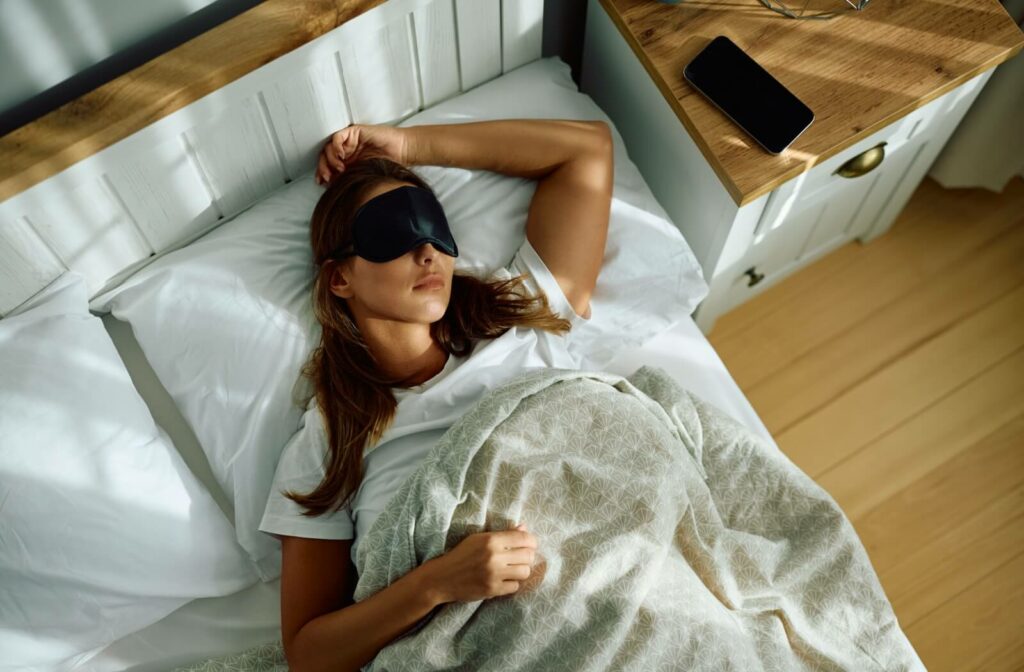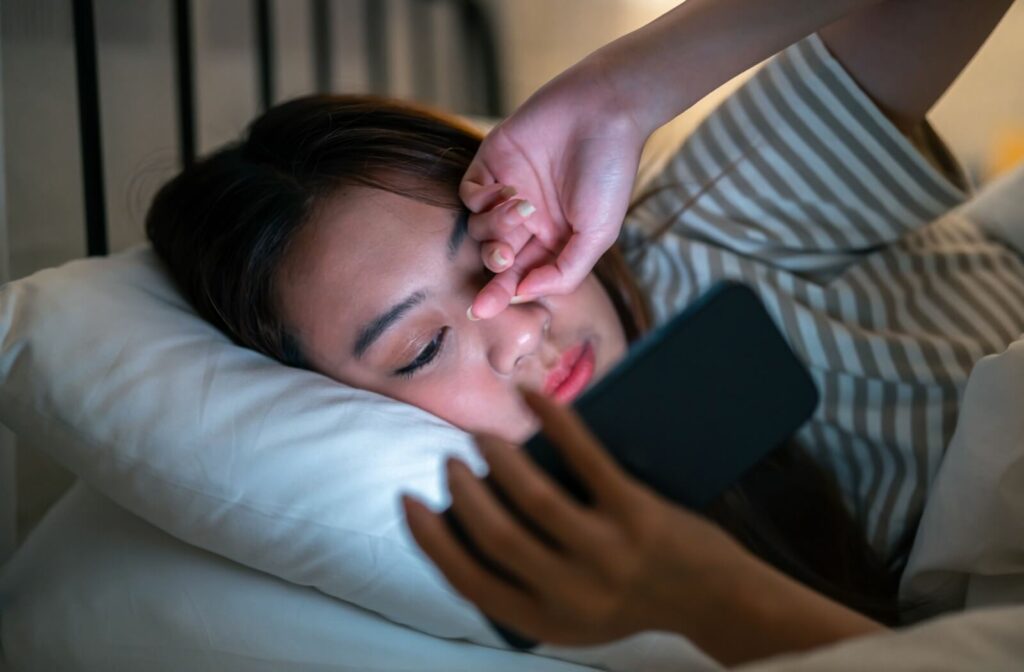Waking up with dry, itchy, or painful eyes can be frustrating and confusing. If you’ve been experiencing these symptoms, you’re not alone. Millions of people struggle with dry eyes during the night. Unfortunately, dry eye can significantly impact sleep quality and overall eye health.
You might be wondering, now, why dry eye is more likely when you’re sleeping. Or, perhaps more importantly—what can you do about it? Low tear production, irritants, various medications, and even your sleep environment all have an impact on dry eye while you’re sleeping. That’s why addressing these factors is important for helping you manage the condition.
This article explores the causes of dry eyes at night and offers tips to achieve relief.
What Is Dry Eye?
Before we dig deeper into causes, let’s start by understanding what dry eye actually is. Dry eye occurs when your eyes don’t produce enough tears or when those tears evaporate too quickly. Tears are essential for lubricating the eyes, keeping them comfortable, and protecting them from irritants. So, when your tears aren’t functioning correctly, your eyes are more likely to become too dry.
Symptoms of dry eyes include:
- A gritty sensation, as if something is in your eye
- Redness or irritation
- Blurry vision
- Itching or pain
- Sensitivity to light
Nighttime dry eyes can amplify these symptoms, disrupting your sleep and leaving your eyes feeling worse the next day.
Common Causes of Dry Eyes While Sleeping
There are several reasons why your eyes might dry out during the night. Identifying the root cause or causes is the first step to finding the right treatment.
Lagophthalmos (Incomplete Eyelid Closure)
When you sleep, your eyelids are supposed to close completely to seal in moisture and protect your eyes. Some people, however, suffer from a condition called lagophthalmos in which the eyelids don’t shut properly during sleep. This leaves the surface of the eyes exposed, leading to increased tear evaporation and dryness.
Some causes of lagophthalmos include:
- Facial nerve damage
- Weakness of eyelid muscles
- Genetics or anatomical issues
Low Tear Production (Tear Gland Dysfunction)
At night, your body slows down tear production as part of its natural sleep cycle. While this is normal, it can leave people who have underlying tear gland dysfunction prone to dryness.
Factors that contribute to low tear production include:
- Aging
- Hormonal imbalances
- Underlying autoimmune conditions like Sjögren’s syndrome
Sleep Environment
Your bedroom’s environment can significantly affect your eye health. Factors such as dry air, high humidity levels, or sleeping with a fan blowing on your face can cause tears to evaporate more quickly, leaving you with dry, itchy eyes by morning.
Common environmental contributors to dry eye include:
- Air-conditioning or heaters
- Ceiling or bedside fans
- Low indoor humidity
Contact Lenses
Sleeping while wearing contact lenses can contribute to overnight dryness. Contacts can absorb moisture from the eyes, so leaving them in for extended periods can interfere with your eyes’ ability to “breathe,” further exacerbating dry eye symptoms.
Exposure to Irritants
Exposure to allergens like dust mites, pet dander, or fragrances in your bedroom can irritate your eyes and cause dryness. Some allergens, like certain pollens, are more likely to be released at night. Additionally, harsh facial cleansers or makeup residue left around your eyes can disrupt tear film and moisture levels.
Medications
Some medications reduce tear production and can make symptoms worse overnight. Common culprits include:
- Antihistamines
- Decongestants
- Blood pressure medications
- Certain antidepressants
Think about whether you’ve recently started using a new medication, as it could be a contributing factor.

How to Relieve and Prevent Dry Eyes at Night
There are several ways to treat and prevent dry eyes while you sleep. Here are some of the more effective options:
Use a Humidifier
If dry air exacerbates your symptoms, using a humidifier can work wonders. In some cases, it may be possible to add a humidifier to your furnace; otherwise, you can buy a smaller humidifier for use in your bedroom.. By increasing moisture levels in the air, a humidifier helps keep your eyes, and your skin hydrated throughout the night.
Consider Sleeping Goggles or Eye Masks
Special nighttime goggles or moisture-sealing masks are designed to protect your eyes while you sleep. These create a comfortable shield that prevents tear film from evaporating, which can be particularly helpful if you’re struggling with lagophthalmos.
Apply a Warm Compress Before Bed
Using a warm compress for 10 minutes before bed can help stimulate the oil glands in your eyelids, ensuring your tears don’t evaporate too quickly. This is especially useful for individuals with meibomian gland dysfunction.
Hydrate and Maintain a Healthy Diet
Your overall hydration levels impact tear production. Drink plenty of water during the day and consume foods rich in omega-3 fatty acids, which are known to support healthy tear glands. Examples include salmon, walnuts, and flaxseeds.
Nighttime Eye Drops or Ointments
Over-the-counter lubricating eye drops (sometimes called artificial tears) can provide instant relief before bed. For more severe dryness, preservative-free gels or ointments may offer longer-lasting hydration overnight. Avoid redness-reducing drops as they can exacerbate dryness long-term.
Adjust Your Sleep Environment
- Avoid sleeping with fans or air conditioners blowing directly on your face.
- Consider anti-allergen bedding and regular cleaning to reduce exposure to irritants.
- If needed, switch to a memory foam pillow, which minimizes pressure on your eyelids.
Evaluate Your Medications
If you suspect that a medication may be worsening your dry eyes, talk to your doctor. They might adjust your dosage or recommend alternative treatments that are gentler on your eyes.
Schedule an Eye Exam
If your symptoms persist despite trying these remedies, there might be an underlying condition causing your dry eyes. Visit an ophthalmologist for a comprehensive eye exam. They can assess your tear production and prescribe advanced treatments if needed.
Why Addressing Dry Eyes Matters for Long-Term Health
Dry eyes aren’t just a nighttime inconvenience. Left untreated, they can lead to complications like eye infections or corneal damage. Addressing the condition early improves not only your quality of life but also your overall eye health over time.
Wake Up to Comfortable Eyes
Nobody wants to start their day with irritated, dry eyes. By identifying the possible causes, making simple changes to your bedtime routine, and seeking professional advice when necessary, you can find the relief you’ve been searching for. Incorporate these strategies today and wake up tomorrow feeling refreshed with eyes that feel just as well-rested as you do.
Looking for expert advice tailored to your needs? Schedule an appointment with our eye care specialists at The Vision Place, and take the first step toward healthier, happier eyes.


